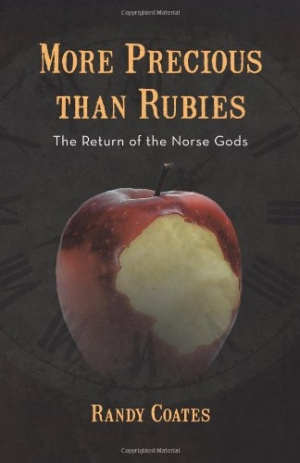More Precious than Rubies
The Return of the Norse Gods
The Norse myth of Iduna’s apples hints at what’s coming next, but Coates’s middle-grade narrative remains exciting and suspenseful throughout.
Randy Coates mixes legends of Norse gods with the travails of a middle schooler making his first strides toward adulthood in his excellent fantasy novel, More Precious than Rubies.
The hero of More Precious than Rubies is Paul Brager, a twelve-year-old living with his father and eight-year-old brother in Ontario, Canada. The death of Paul’s mother, the victim of a car accident five years earlier, lingers over the family as the story begins. Paul and his best friend Chad soon meet a strange, creepy man, Mr. Theisen, who turns out to be the new principal of their school. They also begin pet-sitting the dog of another teacher, Mr. Donlevy. Mr. Donlevy becomes an ally in the boys’ quest to discover the truth about Mr. Theisen, who is strangely linked to the failing health of Paul’s younger brother.
The book is geared toward the preteen age group. Coates, an elementary school teacher, captures the characters of Paul and Chad perfectly, with the budding independence and maturity appropriate to their age, as well as the uncertainty that accompanies a lack of experience. The Norse myth of Iduna’s apples, outlined early in the book, gives readers a hint of what’s coming, but Coates reveals the pieces of his mystery slowly and preserves the sense of the unknown throughout. Gradually, a link between Paul’s parents and Mr. Theisen is established, and Paul discovers the significance of the bowl of apples Mr. Theisen keeps on his desk—they are Iduna’s apples, granting youth and health to whoever eats them: “Theisen acted so strangely, tossing snow, smiling deliciously. Because. Because he knew what the apples were. What the apples were…Something more precious than rubies.”
Paul realizes that the Norse myth is, in a sense, being relived—his mother Ida taking the place of Iduna, his father Mr. Brager instead of the god Bragi, and Mr. Theisen instead of Thiassi, the giant who desires the apples. Coates writes well, and his dialogue is convincing. He often refers to Paul’s father as “Brager,” rather than “Mr. Brager,” even in scenes where both father and son are present. It’s an odd style choice, and sometimes reads strangely, but is perhaps intended to emphasize the link between Brager and “Bragi.” The occasional deus ex machina moment decreases the excitement of some scenes.
Whether Coates will endeavor to adapt other Norse myths is unknown, but the foundation exists for a series if he chooses to continue with these characters. Whether it becomes the first in a series or not, More Precious than Rubies is an enjoyable, self-contained tale that will entertain young readers and bring an ancient myth to life.
Reviewed by
Peter Dabbene
Disclosure: This article is not an endorsement, but a review. The publisher of this book provided free copies of the book and paid a small fee to have their book reviewed by a professional reviewer. Foreword Reviews and Clarion Reviews make no guarantee that the publisher will receive a positive review. Foreword Magazine, Inc. is disclosing this in accordance with the Federal Trade Commission’s 16 CFR, Part 255.

